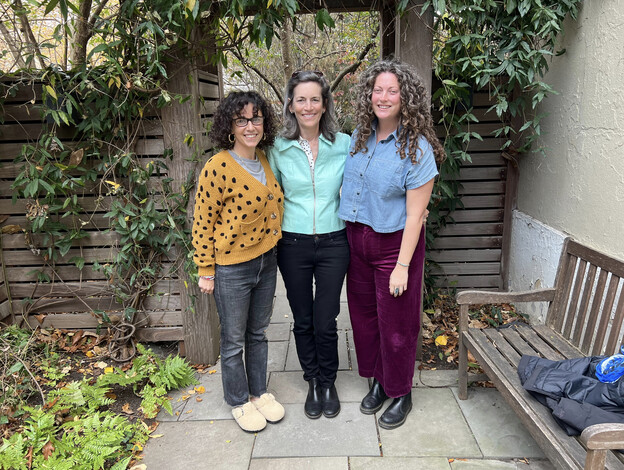
Walking the walk (PoemTalk #197)
Marjorie Welish, “Begetting Textile”

Al Filreis convened Michelle Taransky, Christy Davids, and Sally Van Doren. Sally traveled to be with us for the day: she gave a an evening reading of mostly her new poems, paired with a reading by Michelle; and she spent more time in our studio in an interview with Al about her new poems. For the PoemTalk episode — we discussed a series of numbered poems by Marjorie Welish, going under the title “Begetting Textile.” We’ll be discussing four verse sections in this sequence, those numbered 1, 2, 10, and 13. “Begetting Textile” was included in Welish’s book Word Group published by Coffee House Press in 2004. The recordings of our selection of these poems come from two readings — a Belladonna Series reading in May 2006, and a Segue Series reading given at the Bowery Poetry Club in March 2008. The two readings are available to PennSound’s Welish page. And here are links to the poems: pages 1, 2, 3, 4, 5.
The poems are texts in the sense of text inside the term textile. They are barely raveled. Phrases do and don’t knit. When someone in one of the poems puts on a sweater (inside a factory in which sweaters are made?), somehow the act overcomes mimesis. Fragmentation, the group agrees, is not the vibe — that’s too definitely indefinite. No, Welish deploys phrasings on the page that convey the unraveling of work (and the meaning of work, especially women’s work) rather than fractioning, shattering, and atomizing. There is a wholeness to the untangling. The “impossible work” of reading finds for us hypothetical situations. These are “situations impersonating a book.” But the experience is not that of a book. Rather, it's the making of a fabric. The analogy to fabrication and weaving, as a long-standing (feminist) alternative to conventional narration, reminds us that poems when loosely made are beautiful and coherent even if not conventionally legible.
This episode of PoemTalk was recorded and engineered in our Wexler Studio by Magda Andrews-Hoke, Makena Deveraux, and Élan Martin-Prashad, and it was then edited, as always, by Zach Carduner.